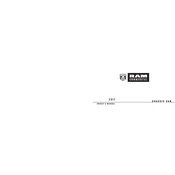Ram Chassis Cab 2017 Owner's Manual


Regular maintenance for the diesel engine includes changing the oil and oil filter at recommended intervals, checking and replacing the air filter, monitoring coolant levels, and ensuring the fuel system is clean. Always use the recommended oil grade and genuine parts for replacements.
First, check the battery connections and ensure they are clean and tight. Test the battery voltage and charge if necessary. If the battery is fine, inspect the starter and ignition system. Consider consulting a professional if the problem persists.
To enhance fuel efficiency, maintain proper tire pressure, reduce unnecessary weight, ensure regular engine maintenance, and drive at steady speeds. Avoid excessive idling and aggressive driving styles.
The towing capacity depends on the specific model and configuration. Refer to the owner's manual for exact figures, but generally, it can tow between 10,000 to 25,000 pounds when properly equipped.
Check the refrigerant level and inspect for any leaks. Ensure the AC compressor is engaging and that the cabin air filter is not clogged. Additionally, verify that the electrical connections to the AC system are secure.
Tire pressure can vary based on the load and usage, but typically it should be around 65 psi for the front tires and 80 psi for the rear tires. Always refer to the placard on the driver's door for precise recommendations.
Turn the ignition to the "ON" position without starting the engine. Press the gas pedal three times within 10 seconds. Turn the ignition off and then start the engine to check if the maintenance light has been reset.
Common issues may include delayed shifting, slipping gears, or a rough transition between gears. Regularly check transmission fluid levels and condition. If problems persist, a diagnostic from a professional mechanic may be necessary.
It's recommended to inspect the brakes every 12,000 miles or once a year, whichever comes first. However, if you experience any unusual noises, vibrations, or decreased braking performance, inspect them immediately.
Use a high-quality, ethylene glycol-based coolant with corrosion inhibitors suitable for aluminum engines. Check the owner's manual for specific recommendations and ensure the coolant is mixed at a 50/50 ratio with distilled water.